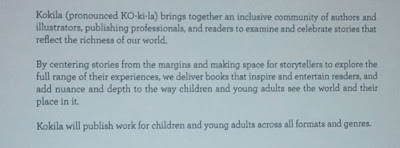The History
Kokila was born out of optimism and frustration," Tripathi explained. "I wondered, what could I do to contribute to a more inclusive publishing industry?"
The Mission
Tripathi discussed the diversity statistics cited by the CBC, which found that while diverse representation had risen, the number of diverse creators (especially Latinx) had actually fallen. Lee and Low's study of the children's publishing industry found that it was highly homogeneous (white, female, straight).
Her hope is that Kokila can address three things at once:
- Diversity on the page
- Diversity in the workforce
- Diversity among creators (writers and illustrators)
Tripathi's vision is a "brain trust," where everyone at Kokila can come together to lend their expertise and voice, in order to create a "deeper, intellectually rigorous process" where, if creators don't have to spend time teaching about their background, they can spend the time creating richer stories. Her view is very much something that is greater than the sum of its parts, where everyone is invested in the model and the mission.
The Books
Upcoming Kokila lists will include works by Pablo Cartaya, Sherine Hamdy and Myra El-Mir, Isabel Quintero and Zeke Peña, John Corey Whaley, and Calista Brill and Nilah Magruder. The first Kokila books will be published in Summer 2019.
"Kokila" is the Sanskrit name for the koyl bird (a type of cuckoo) of Southeast Asia. "It has literary significance because it sings before the monsoon. It's a harbinger of new beginnings," Tripathi said.
The Q&A
A number of people asked whether Kokila would only publish only POC. Tripathi was extremely careful in how she stated Kokila's mission, which includes being wary of stereotypes. "Writing outside of your own experiences requires empathy research, work, patience, pushback and more work," she noted. "Most people don't want to do that."
Among the questions asked was one from a white illustrator who decried the fact that many publishers prefer "own voices" and seemed to be seeking permission/validation. Tripathi gently suggested that the illustrator interrogate her concerns/unhappiness.
Another attendee asked, "With so many new imprints dedicated to publishing diversely; aren't you worried about the competition?" Tripathi answered, "This question sees
marginalized writers as commodities... The idea of pitting one against the other is BS and I'm not here for that."
"Diversity is not a trend--another statement that makes me angry."






No comments:
Post a Comment